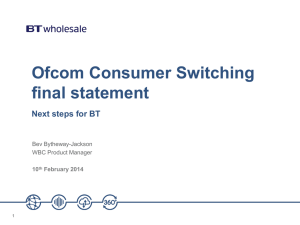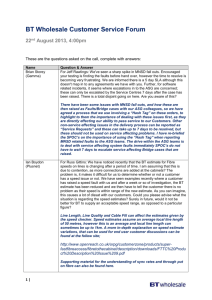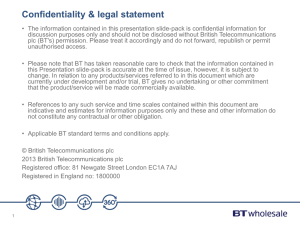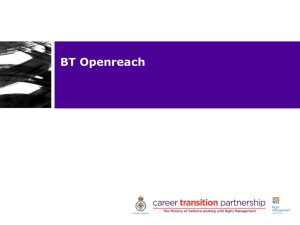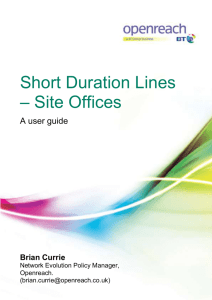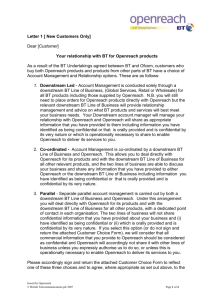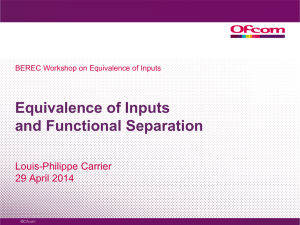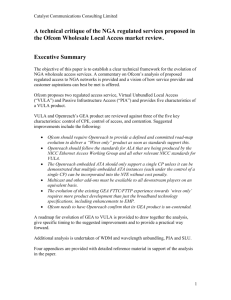TalkTalk%20Ofcom%20submission%20
advertisement
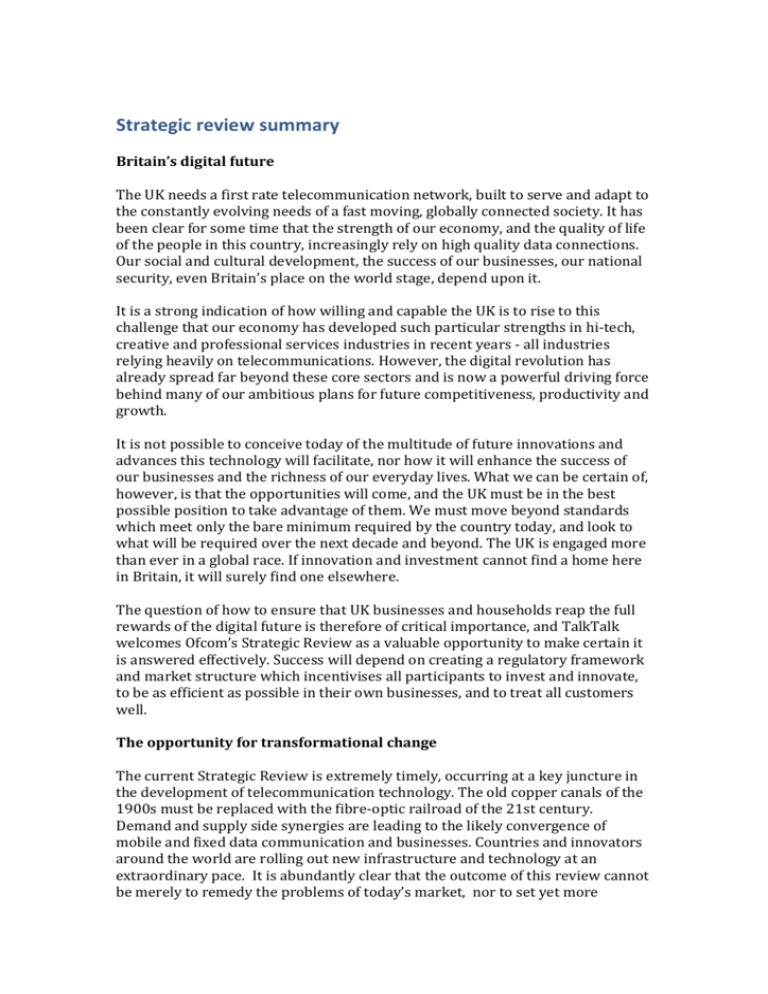
Strategic review summary Britain’s digital future The UK needs a first rate telecommunication network, built to serve and adapt to the constantly evolving needs of a fast moving, globally connected society. It has been clear for some time that the strength of our economy, and the quality of life of the people in this country, increasingly rely on high quality data connections. Our social and cultural development, the success of our businesses, our national security, even Britain’s place on the world stage, depend upon it. It is a strong indication of how willing and capable the UK is to rise to this challenge that our economy has developed such particular strengths in hi-tech, creative and professional services industries in recent years - all industries relying heavily on telecommunications. However, the digital revolution has already spread far beyond these core sectors and is now a powerful driving force behind many of our ambitious plans for future competitiveness, productivity and growth. It is not possible to conceive today of the multitude of future innovations and advances this technology will facilitate, nor how it will enhance the success of our businesses and the richness of our everyday lives. What we can be certain of, however, is that the opportunities will come, and the UK must be in the best possible position to take advantage of them. We must move beyond standards which meet only the bare minimum required by the country today, and look to what will be required over the next decade and beyond. The UK is engaged more than ever in a global race. If innovation and investment cannot find a home here in Britain, it will surely find one elsewhere. The question of how to ensure that UK businesses and households reap the full rewards of the digital future is therefore of critical importance, and TalkTalk welcomes Ofcom’s Strategic Review as a valuable opportunity to make certain it is answered effectively. Success will depend on creating a regulatory framework and market structure which incentivises all participants to invest and innovate, to be as efficient as possible in their own businesses, and to treat all customers well. The opportunity for transformational change The current Strategic Review is extremely timely, occurring at a key juncture in the development of telecommunication technology. The old copper canals of the 1900s must be replaced with the fibre-optic railroad of the 21st century. Demand and supply side synergies are leading to the likely convergence of mobile and fixed data communication and businesses. Countries and innovators around the world are rolling out new infrastructure and technology at an extraordinary pace. It is abundantly clear that the outcome of this review cannot be merely to remedy the problems of today’s market, nor to set yet more minimum standards which will barely cater to the needs of today’s customers, let alone those of the future. The benchmark of our ambition should not be to compare well against the average of our European counterparts, nor to solve yesterday’s problems. Rather, we need to be bold in creating a world leading market which is fit for purpose for the next generation and beyond. This is an ambitious goal, requiring a candid and critical analysis of where we are today, and a determined, cohesive approach to the future. Building a fit for the future, state of the art network is no small endeavour. It will not be simple and it will not happen without clear vision and bold action. Above all, TalkTalk believes it cannot be delivered without a truly competitive market. Effective competition Ofcom identifies efficient investment and effective competition as its twin objectives. We strongly agree and, unlike some market participants, we see no tension between these objectives. Effective competition is the best driver of efficiency, investment and innovation. TalkTalk entered the UK market as a competitive challenger to BT, a former national monopoly which inherited a state funded infrastructure network and 100% of UK customers through the privatisation process. Our objective was to ensure that affordable access to telecommunication services, which had previously been a privilege, became a right for everyone. We have remained absolutely committed to this goal over the last decade, and our position as a competitive challenger has not only benefitted our customers; it has helped to drive down prices and spur innovation across the whole market. However, 30 years after privatisation and despite the full competitive force of challengers like TalkTalk, the UK market remains dominated by the ex-monopoly incumbent, BT. BT is still owner of the copper network, which connects over 80% of all homes and businesses and its retail division accounts for 70% of all superfast broadband connections over BT’s FTTC network. BT also secured 100% of state funding for the fibre broadband rollout. If its merger with EE goes ahead, BT will gain one third of the mobile market and its dominance will increase still further. An incumbent of this size or reach will never have a strong enough incentive to invest in transformative new technology and infrastructure. Instead, as history has shown and BT’s plans confirm, BT’s motive is to extract as much value as possible from its existing copper assets and prioritise capital investment in other group activities such as the acquisition of TV sports rights and of the mobile network operator, EE. We cannot expect this approach to change whilst customers on its old networks, largely insulated from competition, continue to generate healthy returns. Where is competition under threat today? To deliver the infrastructure which underpins the UK’s digital future requires effective competition in four places where it either does not exist currently, or is under severe threat: A level playing field for competition in infrastructure. Openreach’s investment and commercial decisions are primarily driven by a combination of regulation and the demands of BT Retail. Neither of these two drivers will produce sufficient incentive for Openreach to be pushed to the limits of its extensive experience and potential. Separating Openreach from BT would allow Openreach greater freedom to partner on investment with other retail providers without the fear of vertical abuse; and would simultaneously free up BT Retail to collaborate with other infrastructure builders. This level playing field is much more likely to drive innovation and investment. Retail competition to provide superfast and ultrafast broadband. Ownership of Openreach has given BT retail a very substantial advantage particularly in superfast broadband, where it has manipulated its control over product design and pricing to secure a 70% share of all Openreach connections. Not only does this directly harm customers through higher prices, it also reduces competitors’ ability to develop the necessary scale to invest in their own FTTH infrastructure, which would create incentives for Openreach to invest faster. An independent Openreach has a greater incentive than BT Group does to drive higher take up across all their customers, leading to quicker payback and greater investment in future. Competition to offer compelling quad-play offering. The quad-play market, combining content with fixed and mobile connections, is still nascent. However, the combination of huge increases in data demand and the development of offloading technologies like femto-cells, suggest quad play will capture a large part of the market, bringing substantial efficiency gains and quality improvements. However, for consumers to benefit from quadplay, we must have strong competition between quadplay providers. This requires a market structure which does not allow foreclosure of any one element of the package. The current course of consolidations is therefore deeply concerning and we share Ofcom’s view that four mobile network operators are required to safeguard competition and ensure customers are treated fairly. If allowed to progress unchecked, the outcome of the currently proposed mergers will mean substantial competitive harm, both to market participants and to their customers, and will significantly reduce incentives to innovate and invest across the value chain. Openreach separation will help, but it will be equally important to ensure that consumers have meaningful choice of fixed and mobile providers; are able to easily switch between quad play providers; and are not paying for products they do not want because they are not regular switchers. The market is increasingly promotion-led, with the result that large groups of customers who do not choose (or are unable) to switch, are in effect subsidising promotional offers for the small minority of the market which does. We fully support Ofcom’s emphasis on empowered consumers, as this is a crucial element in any competitive market to ensure providers are efficient, innovative and above all treat customers fairly. There are no competitive drivers for better service provision. Consumers and businesses are experiencing unacceptably low (and in some areas worsening) levels of service quality from Openreach, due to inadequate investment and the skewed incentives of Openreach, both caused in large part by ownership of Openreach by BT. Openreach’s pledges on service in its recent ‘Charter’ amounted to little more than promises (which have been made since 2006) to meet minimum service levels. This is a poor reflection of the high degree of experience and expertise of Openreach as an organisation. As an independent organisation, Openreach would be fully focussed (both operationally and in terms of investment) on the provision of the best possible service for customers. Arguments against separation We do not think BT’s arguments provide a sufficiently robust case against structural separation. It is also important to bear in mind that the question of whether Openreach separation is the right outcome for the UK must be kept separate from the question of whether it would require time and effort to deliver: BT argues that Openreach needs BT Retail as an ‘anchor customer’. However, structural separation will allow Openreach to have many different anchor customers, not just one. More collaboration with its wholesale customers and more competition between them can only be positive for an infrastructure provider. This will unlock Openreach’s potential, offering the chance to develop new models of working and sharing innovation, research and development. Openreach’s success is not dependent on BT Group, as BT suggests – far from it, Openreach can easily access finance and R&D support elsewhere. Analysis by Redburn Partners, based on international comparisons, suggests separation as a ‘risk reduction strategy’ would increase value for investors. Openreach’s current strategy is necessarily constrained by its role as an adjunct of a large corporate focused on aggressive expansion of its retail and mobile businesses. This will only intensify if the BT/EE merger proceeds and BT Group becomes focused on integrating Britain’s biggest mobile provider. This risks relegating Openreach to a back office business, starved of the management focus and capital required to transform Britain’s digital infrastructure. A unified BT is not the best route to the infrastructure of the future. In fact, BT is deliberately taking a cautious, staggered approach to rolling out faster network technologies, which risks leaving the UK behind. This is ostensibly in order to offset risks and provide capital for investors elsewhere in its business model, but is ultimately a drag on customer adoption, as it requires upgrades on a periodic basis with each new technology. Implementing separation will not be as complex as BT claims, since most of the difficult steps have already been completed in order to reach the current functional separation model. De-mergers such as these, including the treatment of pensions, are a well-trodden path. BT itself spun off Cellnet in 2002, (at the time, the largest rights issue in UK history) in a process which took a matter of months. A de-merger would allow for regulatory simplification through lifting regulation aimed at preventing vertical abuse, and making the remaining regulation more easily enforceable. Additional concerns and remedies Aside from market structure, Ofcom’s review also raises a number of additional factors which may well create barriers to the sector’s future development and result in harmful outcomes for customers. Many of these are ‘no regrets’ policies which would yield some benefits, regardless of the outcome on Openreach separation. These are considered below: Consumer engagement is weak (and worsening); with the consequence that far too many consumers are getting poor deals. Ofcom should extend gaining-provider led switching across bundles and encourage more switching making offers easier to understand and compare. The level of litigation in the sector has become an impediment to progress. The proportion of decisions appealed is simply too high, resulting in expensive litigation which delays important regulatory developments and increases uncertainty for market participants. In the interests of the industry and its customers, the Government should push ahead with the appeal reforms proposed in 2013. BT has been able to achieve excessive returns on wholesale prices, of at least £6bn, resulting in high retail prices and weakened competition. This is a staggering sum and a terrible outcome for customers. The causes must be fully understood and firm action taken to ensure it is never repeated. Wholesale price caps should be imposed on fibre products. Since 2009, BT has been able to set prices of at least twice costs, to the detriment on consumers and competition. Openreach should be required to offer a full range of passive remedies to allow ‘deeper’ models of competition, providing customers with lower cost and more innovative services. As described above, quality of Openreach service remains a major problem impacting customers. Quality regulation must be strengthened, including potentially: linking price rises to quality levels; more optionality of service levels; and ensuring that the copper network delivers adequate quality to deliver broadband services. Competition in mobile is weak, and investment is lagging. The mergers, if approved without major remedies will significantly exacerbate these problems. Depending on the outcome of the merger reviews, Ofcom should promote entry of a new mobile network operator. It should also review the impact of the current mast-sharing JV’s on competition and incentives to invest
